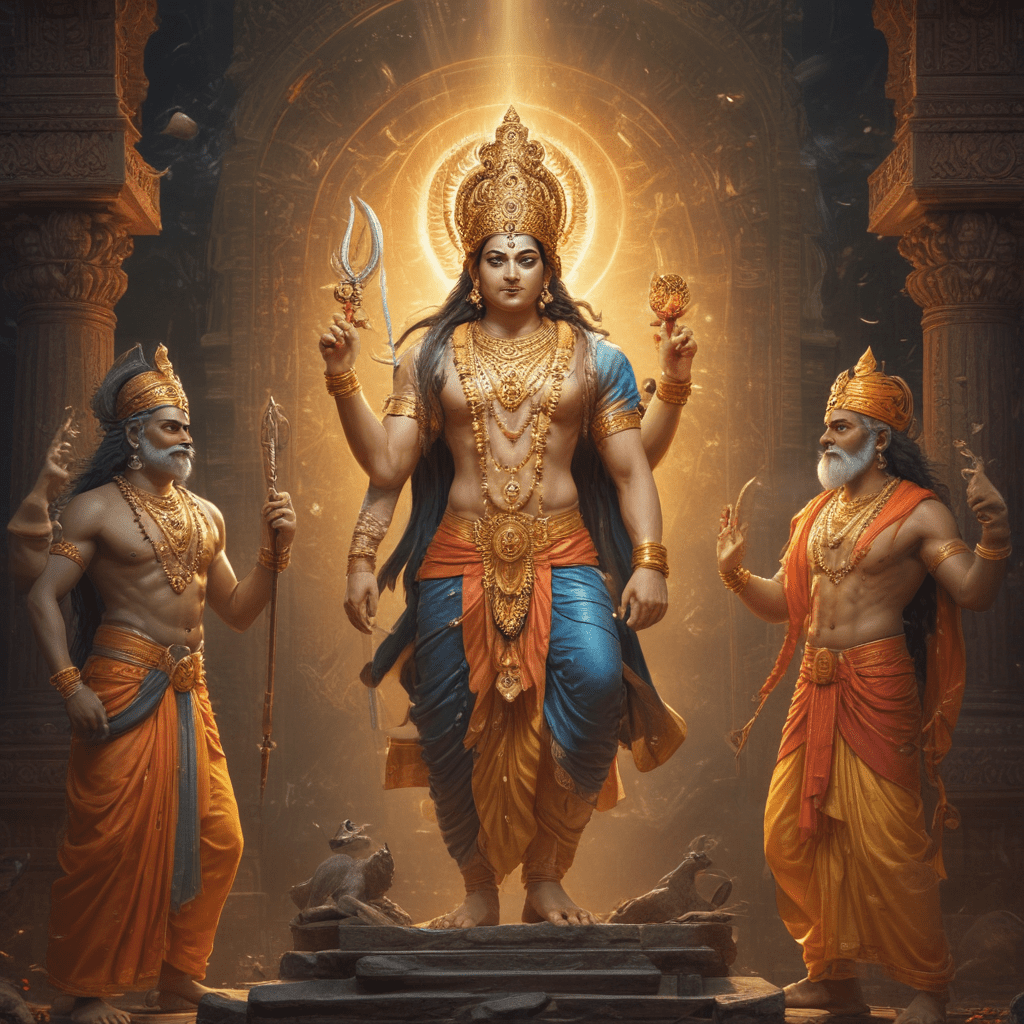The Mythical Sages in Hindu Mythology
Sages, also known as rishis, hold a prominent position in the tapestry of Hindu mythology. They are revered as enlightened beings who possess profound wisdom and divine powers. These mythical figures have played a pivotal role in shaping Hindu beliefs, rituals, and literature.
1. Introduction:
Sages in Hinduism are recognized for their extraordinary knowledge of the Vedas, the sacred texts that form the foundation of Hindu beliefs. They are often depicted as solitary figures engaged in deep meditation or spiritual austerities in secluded forests or mountain caves. Through their spiritual practices, sages are believed to have attained superhuman abilities, such as clairvoyance, telepathy, and the power to manipulate the elements.
2. The Seven Great Sages (Saptarishis):
The Saptarishis, or Seven Great Sages, are among the most renowned figures in Hindu mythology. They are revered as the celestial guardians of the universe and are believed to have played a crucial role in the creation of the world. The names and characteristics of the Saptarishis are as follows:
- Kasyapa: The father of gods, demons, and humans
- Atri: Known for his devotion and asceticism
- Vasistha: The divine mentor of Lord Rama
- Visvamitra: A powerful sage who attained the status of Brahma Rishi
- Gautama: The founder of the Nyaya school of philosophy
- Jamadagni: The father of the warrior sage Parasurama
- Bharadvaja: The celestial physician who possessed knowledge of Ayurveda
3. The Sage Vyasa:
Vyasa, also known as Krishna Dvaipayana, is considered one of the most influential sages in Hindu mythology. He is credited with compiling the Vedas into a single text, known as the Mahabharata. The Mahabharata is an epic poem that contains over 100,000 verses and is considered one of the longest literary works in the world. Vyasa's contributions to Hindu literature and philosophy have had a profound impact on Indian culture and spirituality.
4. The Sage Valmiki:
Valmiki is revered as the author of the Ramayana, another epic poem that recounts the life and adventures of Lord Rama. The Ramayana is considered one of the most beloved and influential texts in Indian literature. Valmiki's portrayal of Lord Rama as an ideal hero and his exploration of themes such as dharma (righteousness), karma (action), and bhakti (devotion) have deeply influenced Indian culture and spirituality.
5. The Sage Agastya:
Agastya is a revered sage who is considered the patron saint of Tamil Nadu, a state in southern India. He is known for his knowledge of Ayurveda and yoga. Agastya is credited with bringing Sanskrit, the classical language of India, to southern India and is believed to have played a significant role in the development of Tamil literature. His contributions to Indian culture and spirituality continue to be celebrated in southern India.
6. The Sage Bhrigu:
Bhrigu is one of the foremost sages of the Puranas, ancient texts that narrate the stories of gods, demons, and humans. He is known for his intense asceticism and his mastery of the art of self-control. Bhrigu is also associated with the creation of the Bhrigu Samhita, a text that contains astrological predictions and horoscopes.
7. The Sage Atri:
Atri is a revered sage who is known for his devotion and asceticism. He is the husband of the goddess Anasuya, who is considered one of the most virtuous women in Hindu mythology. Atri and Anasuya are known for their hospitality and kindness, and their home is often visited by gods and sages.
8. The Sage Narada:
Narada is a divine messenger and celestial sage who is known for his role in spreading spiritual knowledge. He is often depicted with a vina, a stringed musical instrument, which he uses to sing and narrate stories about the gods and their deeds. Narada is a mischievous figure who is known for his ability to stir up trouble and create discord.
9. The Sage Durvasa:
Durvasa is a powerful sage who is known for his quick temper and his ability to pronounce powerful curses. He is often portrayed as a wandering ascetic who is easily angered and offended. Durvasa's curses are said to be particularly potent, and those who incur his wrath often face severe consequences.
10. Conclusion:
The mythical sages of Hindu mythology continue to be revered and remembered for their profound wisdom, spiritual powers, and contributions to Hindu beliefs and practices. Their stories have been passed down through generations and continue to inspire and guide Hindus today. The legacy of these mythical figures is a testament to the enduring power of mythology in shaping human beliefs and experiences.
FAQs:
Q1. Who are the Seven Great Sages (Saptarishis)?
A1. The Seven Great Sages are Kasyapa, Atri, Vasistha, Visvamitra, Gautama, Jamadagni, and Bharadvaja.
Q2. What is the significance of the Sage Vyasa?
A2. Vyasa is credited with compiling the Vedas into a single text, known as the Mahabharata.
Q3. Who is the author of the Ramayana?
A3. Valmiki is the author of the Ramayana.
Q4. What is the name of the sage who is considered the patron saint of Tamil Nadu?
A4. Agastya is the sage who is considered the patron saint of Tamil Nadu.



